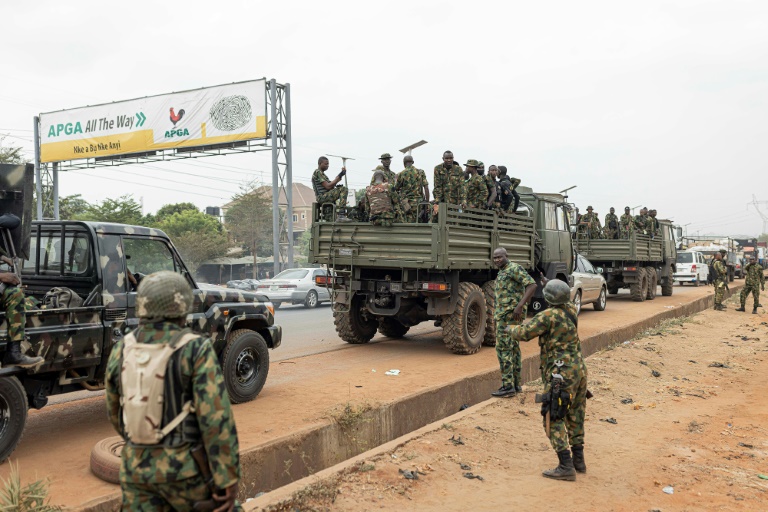Nigeria tallies votes for new president

More than 400,000 security officials were deployed to secure the election
Lagos – Nigeria was counting ballots on Sunday, a day after a historically tight presidential election that has energised Africa’s most populous nation, where many long for change.
The vote was mostly peaceful despite some cases of violence, delays and technical glitches, and citizens stayed up late at night in many locations to observe the count and “protect” the ballots.
The slow uploading of results online was starting to stir up fears of electoral malpractice in a country with a history of vote rigging.
Nearly 90 million voters were eligible to vote on Saturday for a successor to President Muhammadu Buhari, who is stepping down after two terms marked by worsening security and growing poverty.
The election pits former Lagos governor Bola Tinubu, 70, of the ruling All Progressives Congress (APC) against an old rival, former vice president Atiku Abubakar, of the Peoples Democratic Party (PDP), 76.
But for the first time since the end of military rule in 1999, a third-party candidate, Peter Obi of the Labour Party, has challenged the APC and PDP dominance with a campaign message of change.
Spread over more than 176,000 polling units, voters also cast their ballot for Nigeria’s two houses of parliament, the National Assembly and Senate.
– ‘Ready for the challenge’ –
In Lagos and other cities, crowds stormed polling stations late on Saturday as electoral officials tallied the first results by hand and read out the counts before transmitting them to a central database.
“We just finished counting, but we need to make sure they upload the results,” said Chizoba Onuoha, an IT manager, watching the count at her Lagos polling station.
On Sunday morning, people gathered at a newspaper stand in the Falomo area of Lagos, eager for results to come in.
“We are very happy this morning because we have witnessed one of the most peaceful elections in Nigeria and more people turned out than usually,” said 27-year-old mechanic Orubibi Dighobo.
In the southern oil hub of Port Harcourt, a dozen people were still at their polling unit after the counting had finished on Saturday, shouting at the electoral official to destroy unused ballots.
“The empty ballots, we want them to void them, so that they don’t use them!” said Nkechi Njoku, 42, who sells fabric and said she had not left since arriving to vote in the morning.
“We are protecting our votes,” said Robert Ihuoma, a 38-year-old data analyst standing next to her.
Nearby, at Rumuepirikom Civic Centre where electoral staff from 78 polling units were gathered to upload results online, frustrations were growing.
“There is no network,” said an election volunteer, while others were starting to fall asleep on tables and chairs.
As of Sunday morning, results for the presidential election were not yet available on the website of the Independent National Electoral Commission (INEC).
Observers group Yiaga Africa said it was “deeply concerned with the delay.”
The commission has 14 days to officially announce results, but an online tally could be made available in the next hours or days.
Despite the isolated cases of violence and technical problems, INEC remained confident about the electoral process.
“We have lost ballot boxes here and there… but we will continue to protect the process and we will continue to proceed courageously and ensure that we conclude this in a very free, fair and credible manner,” said INEC’s chairman Mahmood Yakubu.
To win the presidency, a candidate must get the most votes but also win 25 percent in two-thirds of Nigeria’s 36 states.
The competitive race has some analysts forecasting an unprecedented runoff between the two frontrunners if no candidate meets election requirements. It would have to be organised within 21 days.
– Complex problems –
The success of Nigeria’s vote will be closely watched in West Africa, where coups in Mali and Burkina Faso and growing Islamist militancy have taken democracy in the region back a step.
Buhari, a former army general, will step down after two terms in office. His critics say he failed in his key promises to make Nigeria safer.
APC’s candidate Tinubu, a long-time political kingmaker and southern Muslim, says “It’s my turn” for the presidency.
He faces a familiar rival — PDP candidate Abubakar, who is on his sixth bid for the top job and touts his business experience.
But both are old guard figures who have fought off past corruption accusations, and the emergence of a surprise third candidate, Obi, has thrown the race wide open.
Fuel and cash shortages in the run-up to the election have also left many Nigerians angry at the establishment, in a country already hit by more than 20 percent inflation.
